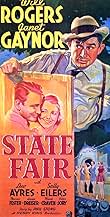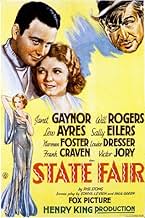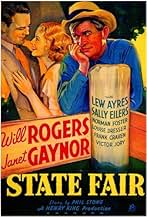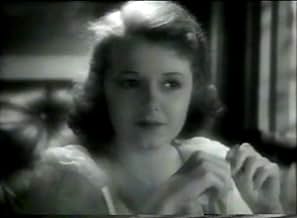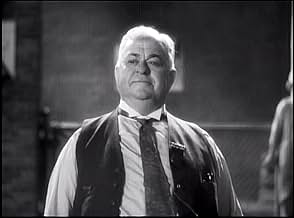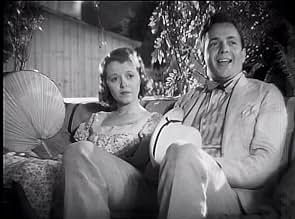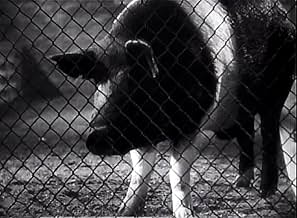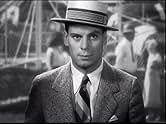CALIFICACIÓN DE IMDb
6.7/10
1.3 k
TU CALIFICACIÓN
Agrega una trama en tu idiomaAn Iowa family finds adventure, love, and heartbreak when they spend a week at the state fair.An Iowa family finds adventure, love, and heartbreak when they spend a week at the state fair.An Iowa family finds adventure, love, and heartbreak when they spend a week at the state fair.
- Dirección
- Guionistas
- Elenco
- Nominado a 2 premios Óscar
- 5 premios ganados y 2 nominaciones en total
Erville Alderson
- Martin - Hog Breeder
- (sin créditos)
Joe Caits
- Baker A. Noblemable - Judges' Secretary
- (sin créditos)
Hobart Cavanaugh
- Professor Fred Coin - Hog Judge
- (sin créditos)
Judge Dike
- Contest Judge
- (sin créditos)
Harry Holman
- Professor Tyler Cramp - Hog Judge
- (sin créditos)
Doro Merande
- Mrs. Metcalfe's Acquaintance at Food Contest
- (sin créditos)
Edward Mundy
- Barker
- (sin créditos)
Dike of Rosedale
- Blue Boy - a Hog
- (sin créditos)
John Sheehan
- Barker at Aerial Act
- (sin créditos)
Opiniones destacadas
This 1933 film of STATE FAIR is nearly impossible to see except on one Fox cable channel, but is the best of all versions, with genuine and unsentimental writing and acting. Director Henry King propels the leisurely plot with a thrilling moving camera that efficiently depicts the varied sensations of a state fair, from wholesome contest fun to the menace of barkers and carnies.
King has a consistent handle on the theme, that the state fair is a quick microcosm of life, an event that thrusts persons together in a venue that makes possible the "rollercoaster" of infatuation (and sex--this is pre-code pleasure), the tension of competition, and the diversion from hard work in this depression era America. Even "Blue boy" the hog and "self object" of Will Rogers' likeable character discovers the same conflicted feelings of sexual attraction. The cast is excellent, with standouts of Rogers, a most natural performer, in a film that is unpolluted by awkward stereotyped supporting players common to his films. A truly stunning-looking Lew Ayres is a dream of a roller coaster partner, and Victor Jory in his silk shirt perfectly embodies the carnie whom small children fear to encounter outside the midway. But it's the quiet moments that register the most--the pensive characters driving at dusk to the fair, full of private anticipation, still totally one as a family. Modern films rarely dare such introspective glimpses, but this film doesn't bore because it is so true. These rural citizens are proud and flawed, but like the wonderful characters in MEET ME IN ST. LOUIS, they embrace the chance to take in the fun and mystery of life.
King has a consistent handle on the theme, that the state fair is a quick microcosm of life, an event that thrusts persons together in a venue that makes possible the "rollercoaster" of infatuation (and sex--this is pre-code pleasure), the tension of competition, and the diversion from hard work in this depression era America. Even "Blue boy" the hog and "self object" of Will Rogers' likeable character discovers the same conflicted feelings of sexual attraction. The cast is excellent, with standouts of Rogers, a most natural performer, in a film that is unpolluted by awkward stereotyped supporting players common to his films. A truly stunning-looking Lew Ayres is a dream of a roller coaster partner, and Victor Jory in his silk shirt perfectly embodies the carnie whom small children fear to encounter outside the midway. But it's the quiet moments that register the most--the pensive characters driving at dusk to the fair, full of private anticipation, still totally one as a family. Modern films rarely dare such introspective glimpses, but this film doesn't bore because it is so true. These rural citizens are proud and flawed, but like the wonderful characters in MEET ME IN ST. LOUIS, they embrace the chance to take in the fun and mystery of life.
I was really surprised how much this film moved me. It's really Gaynor and Ayers' movie with Will in more of a supporting role. Well directed with good effects for the era, my enjoyment was genuine and heart felt. Others might enjoy it in terms of sociology or film history,I hated the Pat Boone version and the Dana Andrews' was only alright. I watched it on TCM where the print had several breaks and audio pops.
Aside from the John Ford/Will Rogers films (embarrassing stereotypes aside) Will's sound films are very mixed. They're tailor made for his persona but weak casts, low production and stage bound screenplays have you reaching for the FF. He redeems most of them but I'm happy to find this solid work made shortly before his death. Surprised it escaped my attention until now.
Aside from the John Ford/Will Rogers films (embarrassing stereotypes aside) Will's sound films are very mixed. They're tailor made for his persona but weak casts, low production and stage bound screenplays have you reaching for the FF. He redeems most of them but I'm happy to find this solid work made shortly before his death. Surprised it escaped my attention until now.
State Fair is actually a pretty good movie that's mostly just a vehicle for Janet Gaynor. But it ends up being more than that with the help of Will Rogers and Lew Ayres.
The story revolves around a farming family who enters a prize pig in the State Fair. The two children of the family go off on their own separate adventures while the two parents stay with the pig.
Gaynor is one of the children and she meets and falls in love with Ayres. Their chemistry together is a very intriguing one. Will Rogers is the father who is mostly the comic relief.
You'll most likely like the film and it deserves to be liked. Its a great gem from the early '30s that isn't seen much anymore.
I was able to finally watch the film when it was on The Fox Movie Channel last year. It might be on again soon. I suggest you find out.
The story revolves around a farming family who enters a prize pig in the State Fair. The two children of the family go off on their own separate adventures while the two parents stay with the pig.
Gaynor is one of the children and she meets and falls in love with Ayres. Their chemistry together is a very intriguing one. Will Rogers is the father who is mostly the comic relief.
You'll most likely like the film and it deserves to be liked. Its a great gem from the early '30s that isn't seen much anymore.
I was able to finally watch the film when it was on The Fox Movie Channel last year. It might be on again soon. I suggest you find out.
The thing about summer love is that it is uncertain and often temporary. Normally, only the young are afflicted, and, as such a powerful emotion is a novelty to the recipient, it can be very hurtful. "State Fair" chronicles two of these.
The Frake family is preparing for the Iowa state fair, all with different expectations. Pa (Will Rogers) hopes his prize boar, Blue Boy, can win first prize and Ma (Louise Dresser) pins her hopes on her pickles and mincemeat. Teenagers Wayne and Margy are just hoping for... they're not exactly sure, but something exciting.
The nominal star here is Will Rogers and he gives a folksy, homespun performance as Pa - makes you wonder if he's acting or not. Louise Dresser is Ma just as you would imagine Ma would be. She was one of our best actresses and retired too soon. The story, though, focuses on the two young players, Norman Foster (Wayne) and Janet Gaynor (Margy) and their adventurous encounters with complete strangers.
This is a 'Pre-Code' picture and tame by todays (lack of) standards, and so both are seen conversing in bedrooms with above-mentioned strangers (smelling salts, please), but the picture is so well-written that the breach of decorum is hardly noticeable. The story is true to life and shot through with vignettes of family life from an earlier time in America. If you were not alive in the 1930's and did not live in the Midwest, you should see this movie. It is a quintessential family picture with lots of heart, as well as exceptional performances by all parties.
The Frake family is preparing for the Iowa state fair, all with different expectations. Pa (Will Rogers) hopes his prize boar, Blue Boy, can win first prize and Ma (Louise Dresser) pins her hopes on her pickles and mincemeat. Teenagers Wayne and Margy are just hoping for... they're not exactly sure, but something exciting.
The nominal star here is Will Rogers and he gives a folksy, homespun performance as Pa - makes you wonder if he's acting or not. Louise Dresser is Ma just as you would imagine Ma would be. She was one of our best actresses and retired too soon. The story, though, focuses on the two young players, Norman Foster (Wayne) and Janet Gaynor (Margy) and their adventurous encounters with complete strangers.
This is a 'Pre-Code' picture and tame by todays (lack of) standards, and so both are seen conversing in bedrooms with above-mentioned strangers (smelling salts, please), but the picture is so well-written that the breach of decorum is hardly noticeable. The story is true to life and shot through with vignettes of family life from an earlier time in America. If you were not alive in the 1930's and did not live in the Midwest, you should see this movie. It is a quintessential family picture with lots of heart, as well as exceptional performances by all parties.
A farm family encounters situations both poignant & hilarious when they leave home to spend time at the exciting STATE FAIR.
Janet Gaynor gives a sensitive performance as a country girl eager for romance amid the attractions of the Fair. She is both fetching and delightful. She was a big celebrity at the time and gets top billing here even over Will Rogers.
Will gets his own back by deftly underplaying his role as her farmer father. By keeping the corniness to a minimum, he gives the film a special touch of bedrock sensibility and good humor.
The Production Code had obviously not taken effect quite yet, as can be seen by some of the language and situations. These will come as a surprise to some, but were not rare before 1934.
All of Will's scenes are fun - especially those with Miss Gaynor or the hogs. The formidable Louise Dresser appears as his wife. Lew Ayres makes a fine romantic interest for Gaynor & Victor Jory is very good in a small role as an honesty-challenged barker.
Janet Gaynor gives a sensitive performance as a country girl eager for romance amid the attractions of the Fair. She is both fetching and delightful. She was a big celebrity at the time and gets top billing here even over Will Rogers.
Will gets his own back by deftly underplaying his role as her farmer father. By keeping the corniness to a minimum, he gives the film a special touch of bedrock sensibility and good humor.
The Production Code had obviously not taken effect quite yet, as can be seen by some of the language and situations. These will come as a surprise to some, but were not rare before 1934.
All of Will's scenes are fun - especially those with Miss Gaynor or the hogs. The formidable Louise Dresser appears as his wife. Lew Ayres makes a fine romantic interest for Gaynor & Victor Jory is very good in a small role as an honesty-challenged barker.
¿Sabías que…?
- TriviaDirector Henry King went to the 1932 Iowa State Fair and Exposition in Des Moines with Stong and a camera crew at the invitation of the fair and filmed background material there. Joseph A. Valentine and Edwin Hammeras photographed background plates, atmospheric shots and race sequences at the fair and used the new Eastman Grayback Background Negative film stock. The rest of the production was shot an Eastman Supersensitive Negative stock and used two cameras wherever possible. Fox purchased three hogs from the fair, including the grand champion, Dike of Rosedale, who was cast as "Blue Boy."
- ErroresThe storekeeper says that Henry VIII had eight wives. He had six.
- Citas
Abel Frake: Wayne's got a girl.
Storekeeper: So did Henry VIII, eight of them, but he always showed up at every state affair with a new one.
- Créditos curiososMost of the credits appear as posters being put up on billboards by workmen. In the film's final scene, there is a heavy rain, and as it washes away the poster bearing the title "State Fair", we see that it was pasted over another poster that says "The End".
- Versiones alternativasThe original version had a bedroom scene in which Emily and Wayne are heard talking offscreen with Emily's negligee lying on a chair, suggesting that they were in bed together for illicit sex. This scene was cut in 1935 from all existing prints in order to get an approval certificate from the PCA for a re-release. The scene is not included in the print that the Fox Movie Channel currently broadcasts.
- ConexionesFeatured in Lest We Forget (1937)
- Bandas sonorasRomantic
(1933) (uncredited)
Music by Louis De Francesco
Lyrics by Val Burton and Will Jason
Played during the opening credits and often in the score
Sung offscreen by an unidentified male at the fair
Partially sung a cappella by Janet Gaynor
Selecciones populares
Inicia sesión para calificar y agrega a la lista de videos para obtener recomendaciones personalizadas
- How long is State Fair?Con tecnología de Alexa
Detalles
- Fecha de lanzamiento
- País de origen
- Idioma
- También se conoce como
- Drzavni sajam
- Locaciones de filmación
- Des Moines, Iowa, Estados Unidos(State Fair and Exposition exterior scenes)
- Productora
- Ver más créditos de la compañía en IMDbPro
- Tiempo de ejecución1 hora 39 minutos
- Color
- Relación de aspecto
- 1.37 : 1
Contribuir a esta página
Sugiere una edición o agrega el contenido que falta

Principales brechas de datos
What is the Spanish language plot outline for State Fair (1933)?
Responda
